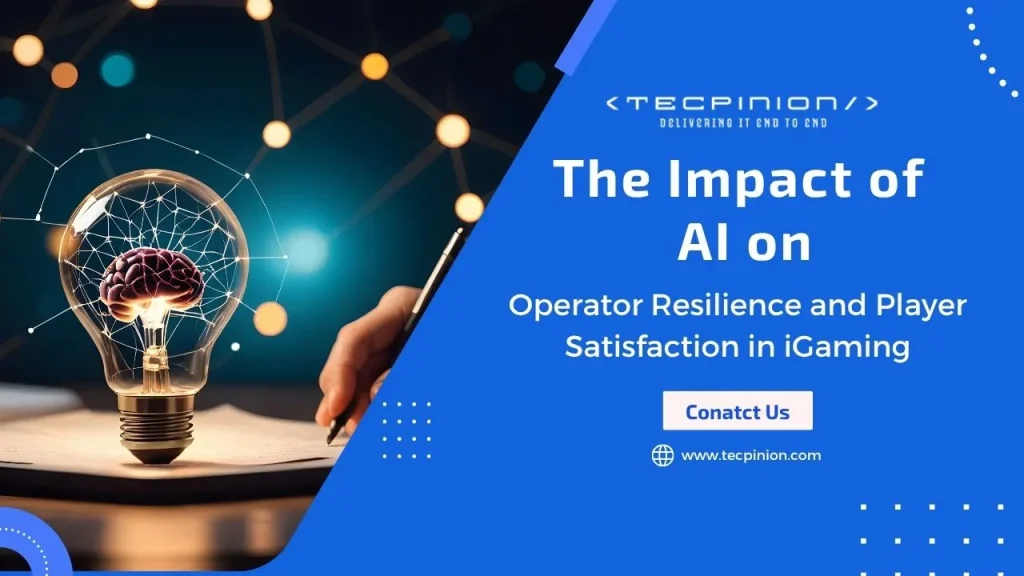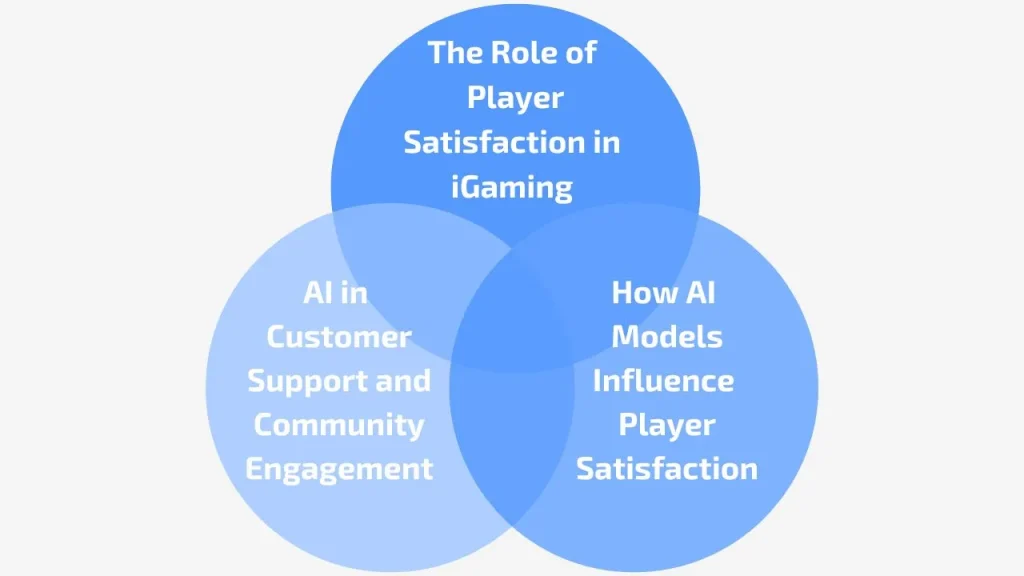The Real Impact of AI Models on Boosting Operator Resilience and Player Satisfaction in iGaming

Table of Contents
- Overview of the iGaming Industry
- The Impact of AI for Operators & Players
- Understanding Core AI Models in iGaming
- How AI Enhances Resilience in the iGaming Industry
- Enhancing Player Satisfaction Through AI
- Ethical Considerations and Challenges
- Future Outlook: AI’s Evolving Role in iGaming
- Key Reasons to Choose Tecpinion
- Conclusion
- FAQs
Overview of the iGaming Industry
The gaming platforms must provide more than just incentives in order to compete with the numerous operators; they are required to provide personalized, secure, and seamless experiences. In today’s fast-changing industry, operators succeed by staying stable, secure, and adaptable while keeping players happy with fair, fun, and engaging gameplay.
In this article, we will explain how Artificial Intelligence (AI) models, such as LTV prediction, forecasting, and anti-fraud systems, are reshaping iGaming by boosting operator resilience and enhancing player satisfaction. Artificial intelligence enables B2B operators to predict trends, prevent fraud, and run more efficient operations. AI is a critical factor in the development of a more intelligent and engaging iGaming industry, as it provides personalized content, prompt support, and secure gameplay.
Current Market Stats
The online gambling industry worldwide is expected to reach a projected revenue of US$ 153,566.1 million by 2030. A compound annual growth rate of 11.7% is expected of the worldwide online gambling industry from 2024 to 2030.
The Impact of AI for Operators & Players
Artificial Intelligence (AI) is changing the iGaming industry for both operators and players. With AI-powered systems, gaming platforms are becoming smarter, safer, and more engaging—creating a better experience for everyone.

1. Impact on Operators:
For operators, AI serves as a powerful tool to strengthen business performance, streamline operations, and maintain long-term resilience.
- Data-Driven Decision Making: AI analyzes massive datasets in real-time, helping operators understand trends, forecast player behavior, and make informed strategic choices.
- Operational Efficiency: Automated systems reduce manual workload—whether in fraud detection, customer support, or marketing optimization—allowing teams to focus on innovation and growth.
- Fraud Prevention and Compliance: The immediate detection of anomalies and suspicious activities by AI models ensures fair play, minimizes financial risks, and ensures compliance with gaming regulations.
- Predictive Forecasting: Operators can enhance retention and reduce attrition by proactively adjusting strategies in response to market fluctuations and player trends.
- Revenue Optimization: AI-based tools like LTV prediction and dynamic pricing help operators identify high-value players, personalize offers, and maximize return on investment.
2. Impact on Players:
For players, AI elevates the overall gaming experience by making it more personalized, secure, and enjoyable.
- Personalized Experiences: The perception of being valued and comprehended is improved by providing personalized content, promotions, or rewards that are based on the preferences of the participant.
- Fairness and Security: By preventing deception, detecting fraud, and guaranteeing fair play across all games, AI systems guarantee a secure and transparent environment.
- Improved Support: AI chatbots and virtual assistants offer instant, 24/7 support—resolving issues faster and improving satisfaction.
- Responsible Gaming: Advanced AI models monitor player behavior to identify risky patterns, helping promote healthy gaming habits and offering timely interventions when needed.
Understanding Core AI Models in iGaming
In the iGaming industry, Artificial Intelligence (AI) helps make gaming platforms smarter, safer, and more enjoyable. It does this by analyzing player data and giving operators useful insights. Here are the three main AI models:
-
Lifetime Value (LTV) Prediction Models:
These models estimate how valuable a player will be over time by studying their behavior — such as how often they play, how much they spend, and what games they prefer. This helps operators identify loyal players, create personalized offers, and improve retention.
-
Forecasting Models:
Powered by a range of predictive models, forecasting leverages historical data to anticipate future trends—from revenue growth and player behavior to game popularity. This enables operators to plan launches, optimize virtual product placement, and prepare for key events, ensuring a seamless player experience while simplifying operations.
-
Anti-Fraud & Risk Detection Models:
These AI systems detect and prevent cheating, money laundering, and other suspicious activities. They study patterns in player behavior and transactions to spot unusual activity in real time. They also help operators follow regulations and keep the gaming environment fair and secure.
In short: These AI models work together to make iGaming platforms more personalized, efficient, and trustworthy — benefiting both operators and players.
How AI Enhances Resilience in the iGaming Industry
-
Predictive Risk Management:
AI-based analytics, including those enabled by real-time capability, detect trends, anomalies, and potential threats panes detecting what human operators often miss. These systems use analysis of player behavior and transaction patterns to hunt for fraud, collusion, problem gambling, and other behaviors, allowing operators to act proactively, limit their losses, and enforce safe play.
-
Operational Efficiency:
Automation with AI improves efficiency on all fronts of gaming platforms. As in e-commerce and more traditional online platforms, chatbots and virtual assistants can provide 24/7 support. Meanwhile, automated payment and data systems reduce errors and speed up processes, ultimately giving the players a smoother experience.
-
Dynamic Personalization:
When it comes to player experience, AI personalizes gaming by analyzing each player’s preferences and habits. It helps firms with customer behavior analytics to better design games, make offers, bonuses, and promotions etc. In real time, improving the degree of engagement, satisfaction, and player loyalty.
-
Regulatory Compliance:
By applying AI, it assists in compliance with monitoring each transaction to a local regulator, confirming player identification, and identifying signs of money laundering or problematic gambling. Thus, AI gives the possibility of coordinating various reports and deposits according to international regulations.
Enhancing Player Satisfaction Through AI

A. The Role of Player Satisfaction in iGaming:
In the competitive world of iGaming (online gaming and casinos), player satisfaction is not just a luxury; it’s a necessity for long-term success. A satisfied player is less likely to ditch the platform for a competitor, more likely to come back for more play, and more likely to recommend the platform to other people. In the long term, this association can lead to an expanding user base – making customer loyalty quite lucrative for businesses of all sizes. Key factors contributing to player satisfaction include:
- Fairness: Players expect transparency and fairness in games, with outcomes driven by chance or skill, not manipulation. Fair play builds trust.
- Excitement: Players want thrilling and dynamic experiences. Games that are engaging, visually appealing, and rewarding tend to retain players longer.
- Social Interaction: Many players enjoy the social aspects of iGaming—whether interacting with friends or other players, participating in tournaments, or sharing achievements.
- Convenience: Seamless platforms that offer user-friendly interfaces, mobile accessibility, and fast loading times are highly valued.
- Custom Content: Players feel appreciated and understood when they are able to offer customized content, promotions, or rewards.
B. How AI Models Influence Player Satisfaction:
AI plays a central role in optimizing player experiences, contributing to personalization, optimization, and predictive gaming.
Personalization of User Experience: AI allows the platform to customize the gaming products it seeks to offer to players’ needs and for efficient inventory management. This allows platforms to offer:
- Personalized Game Recommendations: Suggesting games based on what players have enjoyed before.
- Customized Bonuses and Rewards: Special bonuses and rewards based on player activity and preferences are available.
- Content Customization: Providing personalized content (e.g., exclusive themes or in-game events) to make the player feel special.
- Dynamic Difficulty Adjustment: Games can automatically adjust their difficulty level to suit the player’s skill level, preventing frustration and boredom.
- Real-Time Feedback: AI can provide real-time feedback or tutorials to the players to improve or help the players understand better, and have a hassle-free gaming experience.
- Bonus Timing: AI can predict the best time to offer rewards, such as triggering bonus rounds or free spins at moments that will maximize excitement and satisfaction.
- Reward Prediction: By analyzing a player’s past behavior, AI can predict when a player is most likely to appreciate certain rewards (e.g., free spins, extra credits), ensuring the player feels valued at the right moments.
- Risk Detection: AI algorithms can track signs of problem gambling, such as rapid betting increases, long sessions, or erratic play patterns.
- Intervention Mechanisms: The system helps players play responsibly. First, it can spot when someone is playing too much and send a warning message. Second, the AI can propose tools for self-exclusion, deposit limits, or cool-down periods. The result is that the iGaming experience becomes more satisfying for gamers striving to do it regularly without harm.
C. AI in Customer Support and Community Engagement:
AI’s influence on player satisfaction extends beyond gameplay to customer support and social interaction.
- AI-powered Live Chatbots: Players can obtain immediate assistance from an AI chatbot instead of waiting for an employee to assist them with common problems such as account recovery, bonus inquiries, or payment difficulties. The bot understands natural language processing and can help the consumer using his or her language and conversation, making the interaction with the consumer even more effective.
- Community Moderation and Social Interaction: AI tools help moderate player communities to maintain a safe and respectful environment:
- Automated Moderation: AI allows for scanning player-to-player and player-to-content communication to target toxic performance, inappropriate language, and evidence of cheating.
- Social Engagement: AI can facilitate social aspects, such as helping players connect with like-minded individuals or groups through social features, tournaments, or leaderboards, keeping the sense of community strong.
- Gamification and Interactive Features: AI can also power gamified experiences:
- Achievements and Challenges: AI generates smart challenges or achievements for players to accomplish that keep them interested in long-term games.
- Interactive Events: AI can orchestrate in-game events, like special competitions or surprise bonuses, adding an element of unpredictability and excitement.
Looking for an iGaming Software?
Ethical Considerations and Challenges
-
Balancing Personalization with Player Privacy:
By analyzing user data and providing personalized interest and gameplay, artificial intelligence (AI) enhances gaming. Conversely, privacy concerns arise as a consequence of gaming engagement. Transparency must be preserved by the administrator, and each user's information must be secured while the difference in data consumption and personalization is maintained. Collaboration is required.
Solution: Collect only necessary data, be transparent about its use, and follow data protection laws (like GDPR). -
Avoiding Bias in AI Predictions:
In addition, AI models are also learning from past data. When this data is biased, for example, if the game servers and virtual teammates favored one type of player, then rigged models provide biased recommendations, and this influence is not fair and accurate. It can lead to inconsistent recommendations, biased targeting, and speculation about a player’s worth.
Solution: Regularly audit and update AI models to remove bias and ensure fair outcomes for all players. -
Ensuring Transparency and Regulatory Compliance:
In iGaming, strict rules govern player safety, data handling, and fair play. AI systems must operate within these regulatory frameworks, and operators should be able to explain how AI makes decisions—especially when it impacts players financially or behaviorally.
Solution: Maintain transparency in AI processes, document decision-making logic, and ensure compliance with all gaming regulations.
Future Outlook: AI’s Evolving Role in iGaming
A. Innovations on the Horizon:
AI will bring new and exciting changes that make online gaming more realistic, interactive, and fun.
1. AI-Powered Virtual Reality (VR) Casinos: AI and VR will work together to create online casinos that look and feel like real ones.
- Real-time Interaction: AI avatars will act as live dealers or companions, talking naturally with players.
- Personalized Settings: The casino environment will adapt to a player’s mood, style, and history.
- Social Play: Players worldwide will meet and interact in shared virtual casino spaces.
- Real-World Integration: Players could use their phones to see slot machines or cards appear in their surroundings.
- Adaptive Stories: Games will change based on player actions, emotions, or even location.
- Cross-Platform Play: AI will ensure smooth transitions between mobile, desktop, and AR devices.
- Automatic Game Creation: AI can design new levels, characters, or challenges automatically.
- Emotion Detection: AI could sense frustration or excitement and adjust the game accordingly.
- Voice & Gesture Control: Players may soon play using simple voice commands or hand gestures.
B. Evolving Industry Trends:
AI will drive the next wave of global growth and personalization in iGaming.
1. AI in Emerging Markets: As iGaming expands worldwide, AI will help platforms adapt to new audiences.
- Localization: AI can customize games for different cultures, languages, and preferences.
- Regulatory Compliance: It can automatically adjust to meet local gambling laws.
- Competitive Edge: Companies using AI will offer better support, promotions, and retention, staying ahead in global competition.
- Behavior Insights: AI will study player behavior to predict what they’ll enjoy most.
- Dynamic Adaptation: Games and offers will change in real time to suit each player.
- Emotion Awareness: AI could sense player mood and adjust the experience accordingly.
The Future of iGaming
AI, combined with VR and AR, will create realistic and intelligent gaming worlds that transform how players interact, compete, and experience entertainment.
In the future, the best iGaming platforms will be those that use ethical, transparent, and player-focused AI, offering every player a gaming journey that feels unique, emotional, and exciting.
Key Reasons to Choose Tecpinion
- End-to-End iGaming Expertise – Both established and fledgling operators are supported by Tecpinion’s comprehensive solutions for casino, sportsbook, sweepstakes, and fantasy sports platforms.
- Customization and Flexibility – Every platform is tailored to reflect the operator’s unique brand, strategy, and market needs, ensuring a distinctive and engaging player experience.
- AI-Driven Innovation – We use AI and machine learning to boost player engagement through personalization, predictive insights, and responsible gaming tools.
- Security and Compliance – With strong data protection, fraud prevention, and adherence to global regulations, Tecpinion ensures platforms remain secure, fair, and trustworthy.
- Scalability and Seamless Integration – Built for growth, Tecpinion’s systems easily scale with increasing player demand and integrate smoothly with third-party tools and providers.
Conclusion
AI offers personalized experiences to the participants, guarantees fairness and safety, and grows trust and long-term loyalty. The future of AI in iGaming looks incredibly promising. As technology advances, AI will keep driving innovation—making operations smoother and changing how players experience games through predictive insights, immersive gameplay, and real-time updates. When combined with virtual and augmented reality, it will completely transform player interaction. But with this progress comes the responsibility to use AI ethically.
Operators must innovate responsibly—protecting data, ensuring fairness, and promoting safe play. The future of AI in iGaming relies on balancing innovation with accountability.
FAQs
- How does AI benefit B2B iGaming platforms?
AI also enables B2B providers to create intelligent, personalized, and scalable platform systems. Otherwise, the technology boosts efficiency, enables safe and engaging user experiences worldwide, and propels partner accomplishments.
- Can AI promote responsible gaming?
Yes. AI can detect early signs of problem gambling by analyzing play patterns and spending habits, allowing operators to offer timely alerts, self-exclusion options, or support resources.
- How does AI enhance player satisfaction?
The gaming experience is personalized by AI, which suggests games, incentives, and promotions based on player behavior. Additionally, it guarantees equitable and pleasurable gameplay and enhances customer service through chatbots.
- How does AI help in fraud prevention?
AI continuously monitors gameplay, payments, and player patterns to identify suspicious actions such as cheating, money laundering, or bonus abuse—keeping the platform secure and trustworthy.
- What is the importance of predictive analytics in iGaming?
Predictive analytics uses historical and real-time data to forecast trends in player activity, revenue, and game popularity. This helps operators plan new launches, optimize marketing, and allocate resources effectively.


